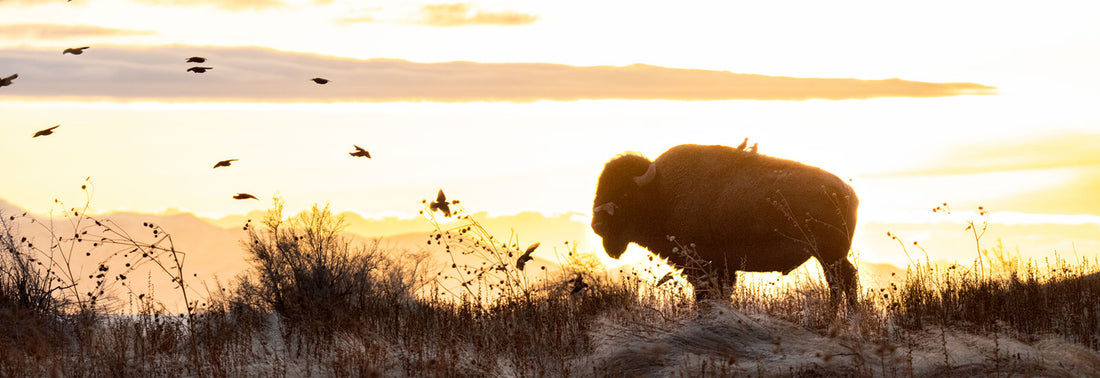When It Comes to Climate Change and Our Food System, We’re Not Having the Right Conversation
Robby Sansom
Climate change is unarguably one of the most pressing issues facing our planet right now, but it isn’t the only environmental crisis and we’re having the wrong conversation about how to solve it. By acting as if eliminating meat is the biggest change we could make to combat climate change, we’re giving the rest of our agricultural system a free pass it does not deserve. Plant-based agriculture is just as responsible for our environmental problems as, if not more than, the conventional meat industry.
Most of the conversation around climate change is focused on carbon emissions—and the notion that conventional meat production contributes to them significantly. While the worst example of animal agriculture does not deserve a free pass either, meat is still not carbon’s biggest generator. Even if we give credence to the highest estimates of the meat industry’s greenhouse gas emissions—which have been challenged and which fail to take into account several important variables—they’re still not as big as those of electricity and heat production or the transportation and manufacturing industries.
Not only are we spending too much time blaming animals as the problem, we’re not spending enough time talking about other parts of our agricultural systems.
We’re not talking enough about pesticides, like glyphosate, and how they’re poisoning us. In 2014, the herbicide Roundup was found in 75% of rainwater samples. In 2015, researchers found glyphosate residue in six of 40 infant formula samples, and three of 18 breast milk samples! Farmers aren’t spraying Roundup on meat and dairy cows; they’re spraying it on monocrops like wheat, corn, and soy. We’re not talking enough about the fertilizers we also spray on those crops of which 80% wash off into and contribute to dead zones in oceans.
We’re not talking enough about the pesticides we spray and how beekeepers are reporting average annual losses of 29 to 45 percent, and how wild pollinators are facing collapse.
We’re not talking enough about how, in 2014, the U.N.’s Food and Agricultural Organization estimated that we may have just 60 harvests left before the world’s topsoil is depleted, or how one-third of the world’s soil may already be depleted beyond repair. We’re not talking enough about how this depletion is being caused by plow and chemical-heavy farming techniques used in mono-cropping. This reporting was made six years ago, and we’ve not addressed the problem—because we’re not talking about it. Because we’re focusing on the wrong things.

We look to plant-based “innovations” like the Impossible Burger or Beyond Meat to combat these issues, but these products rely entirely on monocrop agriculture which perpetuates these issues and promotes the desertification of, not the healing of, our lands. They’re not the solution; in fact, they’re doubling down on the problem.
Rather, the solution includes purchasing better meat, not less meat. And further it means purchasing better plants as well.
Regenerative farmers and ranchers seek to address these issues and others by implementing agriculture practices that work with nature to invigorate entire ecosystems, modelling the way animals, plants and all life interacts in natural systems.
We know that regenerative agriculture can work. Last year, Quantis International, a sustainability research group, completed a life-cycle assessment of White Oak Pastures, a regenerative farm. They found a carbon footprint 111% lower than the conventional U.S. Beef, lower than Beyond Meat and lower than plants like soy beans. In fact, it shows White Oak is one of the many regenerative systems that captures soil carbon, helping offset the emissions of conventional animal and plant agriculture. Quantis’ reporting validates the potential of regenerative agriculture.

It’s clear that the answer to not only the global climate crisis, but also the myriad of other environmental crises we are facing as a result of our intensive and industrialized agriculture practices is not plant-based; it’s planet-based. The only path forward is in working with nature for the production of our food as opposed to combating her. That means managing lands as ecosystems with plants and animals together and emulating the balance and harmony once seen all across our planet.
As consumers, we can effect change by voting at the register with our dollars for brands like Force of Nature and others that are fighting for change. As farmers and ranchers, we can effect change by shifting our practices to be in symbiosis with every other part of our livestock’s ecosystems. And together, all of us can effect change by continuing to have complete and transparent conversations that move all of our food production in the right direction.
